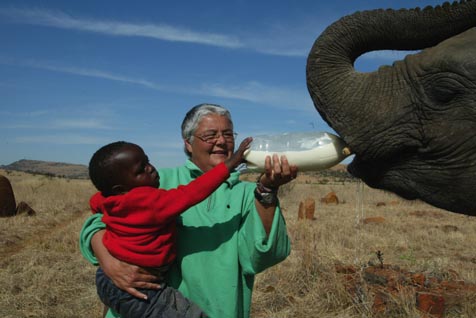Louise Hogarth’s Angels in the Dust Introduces Viewers to South Africa’s Orphans
Where HIV Meets Hope

Thanks to HIV and AIDS, Avalon, the cemetery in the South African township of Soweto, is running out of room. Driving along the road that traverses it, the gravestones stretch out like an ocean of grief, as far as the eye can see.
Yet, if you look hard enough, there are places in this country where life is asserting itself with some hopefulness. One of them is Boikarabelo, a home and school for AIDS orphans run by a well-to-do South African couple who ditched a cushy lifestyle in 1988 to care for underprivileged kids. Marion and Con Cloete spent their life savings on a farm on the outskirts of Johannesburg and quickly began taking in children who had no relatives, or whose homes put them in danger. Today, there are 250 children living in their orphanage, and 280 more kids and families in nearby villages are fed and clothed by their operation.
A recently released documentary called Angels in the Dust captures the ups and downs of daily life inside Boikarabelo. The first scene shows a Monday morning unfolding in one of the dormitories. A little boy has had an accident the previous night and crawled into bed with Marion. With the camera rolling, his head poking out from the foot of Marion’s quilt, he struggles to open his eyes. Another youngster, snuggling up to Marion, complains he is sick and thus unable to go to school. It’s a classic exchange between parent and child on cold, weekday mornings-only this boy has no parents and 249 surrogate siblings. With some gentle teasing, Marion looks in his throat and sends him off to class.
If not for the very real healing that Marion and Con Cloete are accomplishing, Angels in the Dust might be too sad for some people. Many of the children have been raped or prostituted and given the HIV virus in the process. A 7-year-old girl named Lillian tells how a man entered her home, sent her brother out, and raped her. (There is a myth here that having sex with a virgin will cure HIV.) Some kids have lost a parent as recently as the previous day and their grief is palpable.
“We spend a lot of time crying, but also trying to understand what death is,” Marion says after a counseling session with recently orphaned kids. “You just have to accept it.”
Some of these children have been brought back from the brink of their own deaths from AIDS, with the help of anti-retroviral medications the Cloetes have procured through donations. Little Virginia is one of them. The sadness in her eyes will stay with viewers long after the movie is over.
Louise Hogarth wrote and directed Angels in the Dust, which screened at the Santa Barbara International Film Festival in January. Hogarth, who splits her time between Los Angeles and South Africa, is an activist filmmaker, for sure. The 1992 documentary she co-produced, The Panama Deception, won an Oscar for best feature-length documentary.
When it screened at the film festival earlier this year, Angels in the Dust roused a number of viewers to get involved. Gloria Kaye was one of them. She brought a clipboard to the film’s second screening and invited members of the audience to come forward if they wanted to become involved. A number did. A few screenings this week-one by the Santa Ynez Film Group, and three more by Kaye-hope to keep that torch burning.
4•1•1
Angels in the Dust screens on Saturday, April 5, at 6:45 p.m. at Grange Hall (2374 Alamo Pintado, Los Olivos). It also plays in Santa Barbara at ReMax (1903 State St.) on Tuesday, April 8, at 5 p.m. and at the Conceptual Motion Company (1501 Chapala St.) at 7 p.m. on Wednesday, April 9, and Thursday, April 10. Director Louise Hogarth will be at all screenings. See angelsinthedust.org.



